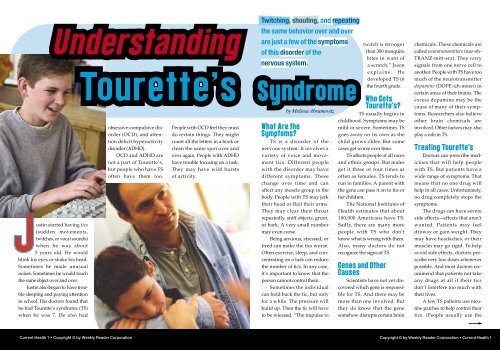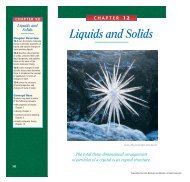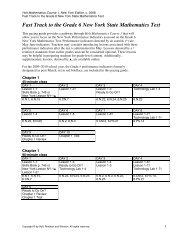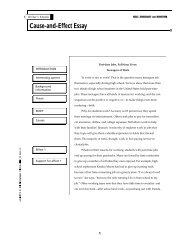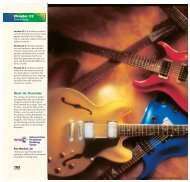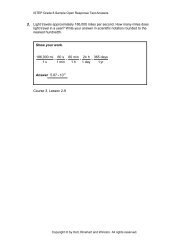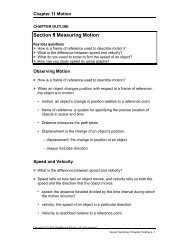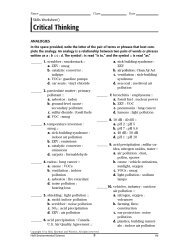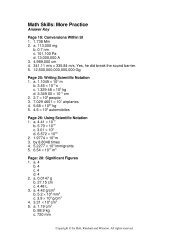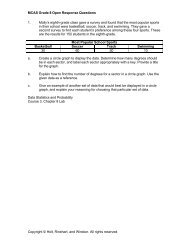Who Gets Tourette's? Genes and Other Causes What Are the ...
Who Gets Tourette's? Genes and Other Causes What Are the ...
Who Gets Tourette's? Genes and Other Causes What Are the ...
You also want an ePaper? Increase the reach of your titles
YUMPU automatically turns print PDFs into web optimized ePapers that Google loves.
ustin started having tics<br />
(sudden movements,<br />
twitches, or vocal sounds)<br />
when he was about<br />
5 years old. He would<br />
blink his eyes or shake his head.<br />
Sometimes he made unusual<br />
noises. Sometimes he would touch<br />
<strong>the</strong> same object over <strong>and</strong> over.<br />
Justin also began to have trouble<br />
sleeping <strong>and</strong> paying attention<br />
in school. His doctors found that<br />
he had Tourette’s syndrome (TS)<br />
when he was 7. He also had<br />
obsessive-compulsive disorder<br />
(OCD), <strong>and</strong> attention<br />
deficit hyperactivity<br />
disorder (ADHD).<br />
OCD <strong>and</strong> ADHD are<br />
not a part of Tourette’s,<br />
but people who have TS<br />
often have <strong>the</strong>m too.<br />
People with OCD feel <strong>the</strong>y must<br />
do certain things. They might<br />
count all <strong>the</strong> letters in a book or<br />
clean <strong>the</strong> same spot over <strong>and</strong><br />
over again. People with ADHD<br />
have trouble focusing on a task.<br />
They may have wild bursts<br />
of activity.<br />
Twitching, shouting, <strong>and</strong> repeating<br />
<strong>the</strong> same behavior over <strong>and</strong> over<br />
are just a few of <strong>the</strong> symptoms<br />
of this disorder of <strong>the</strong><br />
nervous system.<br />
by Melissa Abramovitz<br />
<strong>What</strong> <strong>Are</strong> <strong>the</strong><br />
Symptoms?<br />
TS is a disorder of <strong>the</strong><br />
nervous system. It involves a<br />
variety of voice <strong>and</strong> movement<br />
tics. Different people<br />
with <strong>the</strong> disorder may have<br />
different symptoms. These<br />
change over time <strong>and</strong> can<br />
affect any muscle group in <strong>the</strong><br />
body. People with TS may jerk<br />
<strong>the</strong>ir head or flail <strong>the</strong>ir arms.<br />
They may clear <strong>the</strong>ir throat<br />
repeatedly, sniff objects, grunt,<br />
or bark. A very small number<br />
may even curse.<br />
Being anxious, stressed, or<br />
tired can make <strong>the</strong> tics worse.<br />
Often exercise, sleep, <strong>and</strong> concentrating<br />
on a task can reduce<br />
<strong>the</strong> number of tics. In any case,<br />
it’s important to know that <strong>the</strong><br />
person cannot control <strong>the</strong>m.<br />
Sometimes <strong>the</strong> individual<br />
can hold back <strong>the</strong> tic, but only<br />
for a while. The pressure will<br />
build up. Then <strong>the</strong> tic will have<br />
to be released. “The impulse to<br />
twitch is stronger<br />
than 300 mosquito<br />
bites in want of<br />
a scratch,” Jason<br />
explains. He<br />
developed TS in<br />
<strong>the</strong> fourth grade.<br />
<strong>Who</strong> <strong>Gets</strong><br />
Tourette’s?<br />
TS usually begins in<br />
childhood. Symptoms may be<br />
mild or severe. Sometimes TS<br />
goes away on its own as <strong>the</strong><br />
child grows older. But some<br />
cases get worse over time.<br />
TS affects people of all races<br />
<strong>and</strong> ethnic groups. But males<br />
get it three or four times as<br />
often as females. TS tends to<br />
run in families. A parent with<br />
<strong>the</strong> gene can pass it on to his or<br />
her children.<br />
The National Institutes of<br />
Health estimates that about<br />
100,000 Americans have TS.<br />
Sadly, <strong>the</strong>re are many more<br />
people with TS who don’t<br />
know what is wrong with <strong>the</strong>m.<br />
Also, many doctors do not<br />
recognize <strong>the</strong> signs of TS.<br />
<strong>Genes</strong> <strong>and</strong> <strong>O<strong>the</strong>r</strong><br />
<strong>Causes</strong><br />
Scientists have not yet discovered<br />
which gene is responsible<br />
for TS. And <strong>the</strong>re may be<br />
more than one involved. But<br />
<strong>the</strong>y do know that <strong>the</strong> gene<br />
somehow disrupts certain brain<br />
chemicals. These chemicals are<br />
called neurotransmitters (nur-oh-<br />
TRANZ-mitt-erz). They carry<br />
signals from one nerve cell to<br />
ano<strong>the</strong>r. People with TS have too<br />
much of <strong>the</strong> neurotransmitter<br />
dopamine (DOPE-uh-meen) in<br />
certain areas of <strong>the</strong>ir brains. The<br />
excess dopamine may be <strong>the</strong><br />
cause of many of <strong>the</strong>ir symptoms.<br />
Researchers also believe<br />
o<strong>the</strong>r brain chemicals are<br />
involved. <strong>O<strong>the</strong>r</strong> factors may also<br />
play a role in TS.<br />
Treating Tourette’s<br />
Doctors can prescribe medicines<br />
that will help people<br />
with TS. But patients have a<br />
wide range of symptoms. That<br />
means that no one drug will<br />
help in all cases. Unfortunately,<br />
no drug completely stops <strong>the</strong><br />
symptoms.<br />
The drugs can have severe<br />
side effects—effects that aren’t<br />
wanted. Patients may feel<br />
drowsy or gain weight. They<br />
may have headaches, or <strong>the</strong>ir<br />
muscles may go rigid. To help<br />
avoid side effects, doctors prescribe<br />
very low doses whenever<br />
possible. And most doctors recommend<br />
that patients not take<br />
any drugs at all if <strong>the</strong>ir tics<br />
don’t interfere too much with<br />
<strong>the</strong>ir lives.<br />
A few TS patients use nicotine<br />
patches to help control <strong>the</strong>ir<br />
tics. (People usually use <strong>the</strong><br />
Current Health 1 • Copyright © by Weekly Reader Corporation Copyright © by Weekly Reader Corporation • Current Health 1
patches to help <strong>the</strong>m quit smoking<br />
cigarettes.) The patches<br />
allow <strong>the</strong> patients to take lower<br />
doses of <strong>the</strong>ir o<strong>the</strong>r medications.<br />
Unfortunately, some people<br />
have side effects from <strong>the</strong> nicotine<br />
patches.<br />
Some patients are helped by<br />
behavior <strong>the</strong>rapy. They receive<br />
rewards for concentrating or<br />
controlling some of <strong>the</strong>ir tics.<br />
How You Can<br />
Help Someone<br />
with TS<br />
• Underst<strong>and</strong> that <strong>the</strong> tics,<br />
twitches, <strong>and</strong> strange sounds are<br />
not done on purpose.<br />
• Never imitate or make fun of<br />
someone’s tics. It is hurtful to him<br />
or her—just as it would be to you.<br />
• Many people with Tourette’s will<br />
tell <strong>the</strong>ir friends <strong>and</strong> classmates<br />
about <strong>the</strong> disorder. <strong>O<strong>the</strong>r</strong>s feel<br />
embarrassed about doing so.<br />
It’s best not to pressure some-<br />
one who would ra<strong>the</strong>r not talk<br />
about TS.<br />
• Underst<strong>and</strong> that people with<br />
TS are as smart, athletic, <strong>and</strong><br />
talented as anyone else.<br />
Living with Tourette’s<br />
People with TS agree that<br />
<strong>the</strong> social effects of <strong>the</strong> disorder<br />
can be worse than <strong>the</strong> physical<br />
ones. Children often find that<br />
o<strong>the</strong>rs make fun of <strong>the</strong>ir tics.<br />
This makes <strong>the</strong>m feel stupid<br />
<strong>and</strong> unwanted. Jason’s classmates<br />
imitated his throat <strong>and</strong><br />
arm-stretching tics. He remembers,<br />
“I felt humiliated. Even<br />
though I was a good student, I<br />
felt like I was retarded.” That’s<br />
why TS patients <strong>and</strong> <strong>the</strong>ir families<br />
often seek out support<br />
groups to find out how to cope.<br />
Support groups also provide<br />
information to teachers<br />
<strong>and</strong> school officials. The information<br />
helps <strong>the</strong>m underst<strong>and</strong><br />
a child’s special needs. Susan,<br />
for example, had trouble reading.<br />
Her tic caused her eyes to<br />
move back <strong>and</strong> forth. When her<br />
teacher understood <strong>the</strong> problem,<br />
she was able to give Susan<br />
extra help. <strong>O<strong>the</strong>r</strong> kids with TS<br />
may be allowed to take breaks<br />
from <strong>the</strong> classroom. This allows<br />
<strong>the</strong>m to express <strong>the</strong>ir tics in private.<br />
These small changes can<br />
make a big difference in <strong>the</strong>se<br />
children’s lives.<br />
Educating <strong>the</strong> Public<br />
In addition, famous people<br />
help educate <strong>the</strong> public. They<br />
also inspire o<strong>the</strong>rs with TS<br />
to lead happy, productive lives<br />
in spite of <strong>the</strong>ir symptoms.<br />
Current Health 1 • Copyright © by Weekly Reader Corporation<br />
Michael Wolff of <strong>the</strong> Tourette<br />
Syndrome Association, for<br />
example, is a jazz pianist. He<br />
was deeply embarrassed by his<br />
tics. Then his wife, actress Polly<br />
Draper, convinced him to help<br />
o<strong>the</strong>rs by speaking out about<br />
TS. He also wrote <strong>the</strong> music for<br />
<strong>the</strong> film The Tic Code, which<br />
received rave reviews.<br />
Professional athletes who<br />
have TS also speak out. They<br />
encourage o<strong>the</strong>rs to achieve<br />
<strong>the</strong>ir dreams in spite of TS.<br />
Pro baseball outfielder Jim<br />
Eisenreich has had Tourette’s<br />
since <strong>the</strong> age of 6. But he wasn’t<br />
diagnosed until he was 23. He<br />
had to put his career on hold<br />
while his doctors found <strong>the</strong><br />
right combination of drugs to<br />
control his tics. Then he was<br />
able to get back to being a topnotch<br />
player. Now he enjoys<br />
visiting with young people<br />
who have TS. He lets <strong>the</strong>m<br />
know <strong>the</strong>y can succeed too.<br />
<strong>O<strong>the</strong>r</strong> pro athletes with TS<br />
include NBA star Mahmoud<br />
Abdul-Rauf (formerly Chris<br />
Jackson), baseball player<br />
Charles Johnson, <strong>and</strong> soccer<br />
goalie Tim Howard.<br />
Anyone can have TS. There<br />
are doctors, lawyers, teachers,<br />
actors, nurses, <strong>and</strong> many o<strong>the</strong>rs<br />
in all walks of life who have TS.<br />
Most people with TS lead normal,<br />
productive lives. And<br />
many are very successful. ❏


